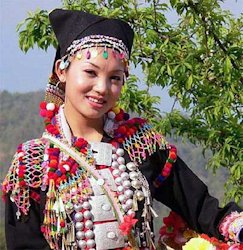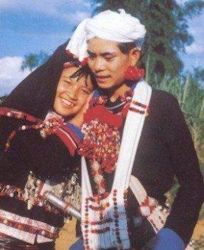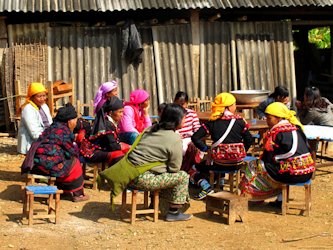|
8. Chinese Nationalities (De'ang Minority) (Benglong, Deang) -- Minorities by Alphabetic Sequence |
||

|

|

|
| De'ang Lady | De'ang Couple | De'ang Group |
|
De'ang ethnic group is one of the oldest tribes living in the southwest frontier region. They date back to the ancient "Pu" people who lived in the Nujiang River region in the second century. In the Sui (581 -618) and Tang (618 - 907) dynasties, they were called "mangman" (mang barbarians), "puziman" (puzi barbarians), etc. They successively submitted to the Han (206 BC - 220 AD), Jin (265 -420) dynasties and Nanzhou and Dali kingdoms. After the Yuan Dynasty (1271 - 1368), they were brought under the control of the Dai ethnic group. Historically, at their peak, the De'ang ethnic group dominated western Yunnan. This was especially during the 12th to 15th centuries, when the Gold Teeth Kingdom founded by their ancestors held sway over the whole region. Later, however, the De'ang ethnic group gradually went into decline and was exploited and oppressed by other tribes. After the founding of PRC in 1949, they were named the Benglong ethnic group and in 1985, officially renamed the De'ang ethnic group at the request of the De'ang people. De'ang people have their own language that belongs to the Wa-Ang branch of the Mon-Khmer group of the Austroasiatic language family. Most De'ang people can speak Chinese and languages of Dai and Jingpo. The De'ang people have no written script of their own and Chinese is widely used. The De'ang nationality live mainly in the Santai Mountains in Luxi County and in Junnong of Zhengkang County, and a small number scattered in surrounding Counties of Yunnan Province. The De'ang villages are usually set amidst dense forests and bamboo groves. They live in bamboo houses set on stilt foundations. The De'ang people are well known "tea growers". The "Dragon Bamboo" planted by them has a diameter of over 6 or 7 inches, which is an important material for buildings and their daily utensils. Tattoos are common among the men. |
||
| Return to Alphabetic List On to No. 9 Minority Derung ⇨ | ||